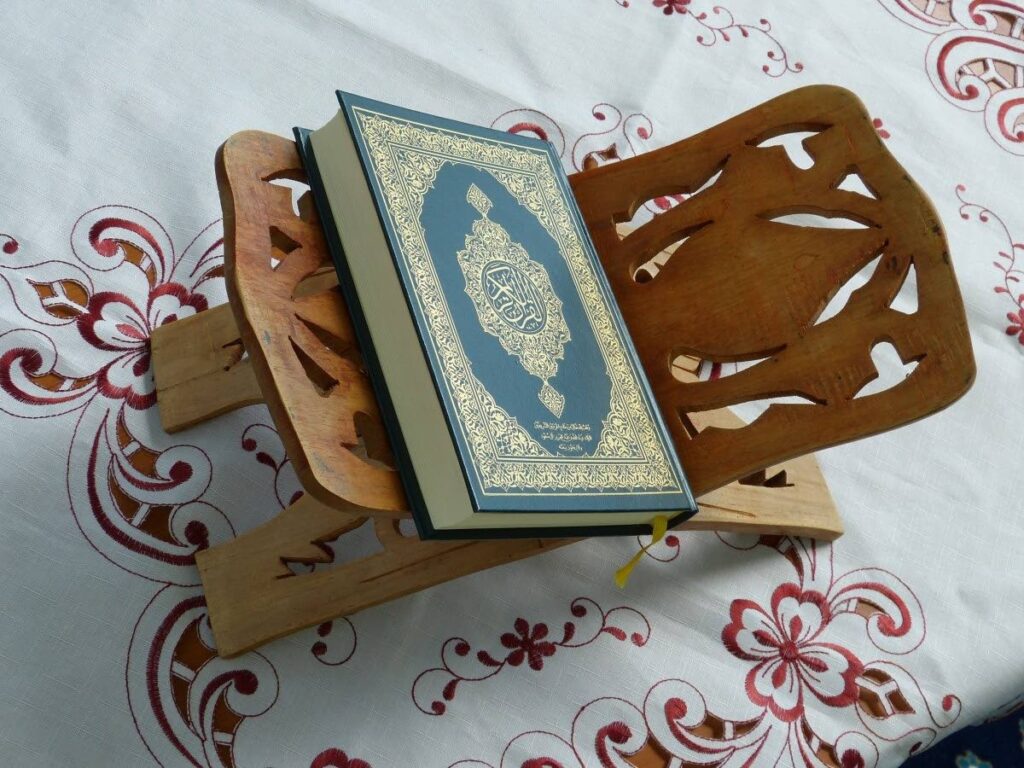Being steadfast after Ramadan

NOORIE K KHAN
AL-IHSAAN INSTITUTE
“Indeed, those who say, ‘Our Lord is Allah!’ and then remain steadfast, the angels descend upon them (saying), ‘Do not fear, nor be grieved! Receive the good news of the paradise, which you have been promised.” (Qur’an 41:30)
Ramadan is a month in which we upgrade ourselves. We spend the month challenging our normal ability to worship. We amaze ourselves by doing acts of
‘ibādah (worship) that we never thought we could ordinarily do. When Ramaḍan ends, we have greats plans to carry on these actions throughout the year and meet the next Ramadan ready and prepared.
The reality: Ramadan has passed and now it’s back to the daily grind. Many of the acts of
‘ibādah that consumed so much of your time have fallen off and are replaced by things of much lesser benefit. Television, music, hours of scrolling through social media…. The
Fajr salāh (morning prayer before sunrise) becomes difficult once again, and daily Qur’an time is unheard of. Ramadan slowly becomes a distant memory. Soon, it will be as though it didn’t even happen. If this is what you’re facing, you’re not alone. This is the conundrum that many of us encounter.
The solution? Whatever you do, don’t break your stride. The Prophet Muhammed said in a
ḥadīth recorded in Ṣaḥīḥ Muslim, “Whoever fasts the month of: Ramadan and then follows it with six days of fasting in the month of Shawwal, it will be as if he had fasted the entire year.” Aside from a year’s reward of fasting, a little-known benefit of observing this sunnah, is that we are encouraged to continue our actions after Ramadan. Unbeknownst to many, the Prophet is sharing the secret of being steadfast: build a habit by following up on your actions. If you can manage to be consistent on some small portion of your
‘ibādah outside of the holy month, this is the mark of a truly successful Ramadan.
But this is easier said than done, right? Very much like our New Years resolutions, we keep it up for a few weeks, if at all, and then we forget all about it. The problem here is that despite all the advice we receive on these topics, we never formulate a clear plan on how to implement this advice. And of course, failing to plan is planning to fail. So, here is a clear system of action going forward:
Step 1: List all of the acts of worship you were able to achieve during the month of Ramadan. Choose the easiest or most important ‘ibādah you believe you can maintain. Don’t worry about the others, you can implement them later on in shaa Allah.
Step 2: Choose a lighter version of that act that you can implement daily, in the same time and manner that you did during Ramadan. It should, of course, exceed what you normally do on a regular day of the year.
Here are some suggestions:
Go from fasting every day to fasting on Mondays and Thursdays. If that is unachievable then try fasting on ayyāmul bīḍ. (This refers to the 13th, 14th, and 15th of the lunar months. This was recommended by the Prophet in ṣaḥīḥ aḥādĪth)
If you were reading some portion of the Qur’an every day then read a quarter of that.
If you were praying 20 raka’āt tarāwīḥ, then maintain the two sunnah and three
Witr after ‘Ishā’.
If you were praying 12 raka’āt sunnah, then pray two or four every day. Work up to praying all 12 on Fridays.
You were able to wake up before dawn every day for fasting, so try to wake up ten minutes before Fajr time comes in, to pray two raka’āt of tahajjud once a week.

If you gave charity every night on the last ten nights, then continue doing that every Friday.
You can also focus on long-term goals, like memorising Surahs, Duas, increasing
khushū’ (concentration) in salaah, understanding the tafsīr (explanation) of the Qur’an, etc.
Step 3: Track these goals by using a habit tracker and ensure that you don’t miss too many of them.
A good rule of thumb is: skip once, but not twice. If you miss one day, that’s fine, but make sure to complete your task the next day. The habit of praying sunnah salaah every day can easily be replaced by the habit of missing sunnah salaah every day if you’re not careful.
Step 4: Keep increasing these goals in increments during the year until you reach your desired amount. If you’re able to complete a goal for a satisfactory period of time without skipping, this is a good indication that you can try increasing it. This method may seem like more trouble than it’s worth, but this is a system built for success. Your life consists of a combination of tasks that you habitually complete every day. If you control those habits, you control the direction your life takes. If your habits control you, you never change or improve. It’s really that simple.
The big question: Why start small? Why not maintain the exact same amount of
‘ibādah outside of Ramadan? Sadly, every month cannot be like Ramadan. Thinking this level of
‘ibādah is an achievable goal, is merely setting yourself up for failure. With the S
hayāṭīn chained, and the mercy of Allah raining down on the ummah, good deeds come easier in the Holy month. Outside of Ramadan, we have to work much harder to achieve smaller-scale results. Knowing this will give you the ability to plan around it.
Ever heard the phrase, work smart not hard?
Every goal you make should be specific; easily explainable and not ambiguous in any way. You should be able to measure it (two
rakaat, one juz, $10 in charity). If your aim is not something achievable, like attempting to fast every day of the year, then success is likely not within your reach. Ensure that you are doing something relevant to your end result; don’t beat around the bush. When planning, time is of the essence. You should have a clear start and end date in mind. Apply this rule to any goal and combine it with dedicated action. With Allah’s help, you will achieve any success your heart desires!
If you leave this article with one thing in mind, it should be this: Upgrade your worship. Why? Many of us forget that Allah has created us to worship. If we are updating our resume, getting promotions at work, making more money every year, but our ‘ibādah hasn’t been upgraded in five years, then we have forgotten our true reason for being here. Many of us fall prey to neglecting our hereafter while cultivating our dunyā. This way leads only to destruction.
“…as compared with the life of the hereafter, the life of this world is nothing but a brief passing enjoyment.” (Qur’an 13:26)
Allah clearly warns us that this life is fleeting and the true success is in the hereafter. With the struggles being faced by the Muslim ummah every day, now more than ever, we need to upgrade our Imaan and our ‘ibādah. We must remain steadfast and unwavering upon our deen, and exhaust ourselves in pleasing Allah.
“And worship your Lord until certainty (death) comes to you.” (Qur’an 15:99)

Comments
"Being steadfast after Ramadan"